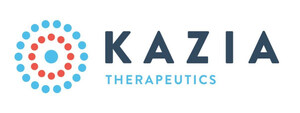SYDNEY, April 8, 2022 /PRNewswire/ -- Kazia Therapeutics Limited (NASDAQ: KZIA; ASX: KZA), an oncology-focused drug development company, is pleased to announce new preclinical data demonstrating the activity of paxalisib in two forms of childhood brain cancer with very high unmet medical need.
This data is the subject of three abstracts presented at the Annual Meeting of the American Association for Cancer Research (AACR), held in New Orleans, LA, from April 8 – 13, 2022.
Two abstracts by scientists working in the laboratory of Assistant Professor Jeffrey Rubens at Johns Hopkins University in Baltimore, MD, describe the use of paxalisib as a backbone therapy in a childhood brain cancer known as atypical teratoid / rhabdoid tumours (AT/RT). This is the first time that data exploring paxalisib in this form of brain cancer has been presented, and it opens an important new potential indication for the drug.
The third abstract, from a different team of scientists at Johns Hopkins University, led by Associate Professor Eric Raabe and Dr Katherine Barnett, showed evidence of strong synergy between paxalisib and another class of cancer therapies in a model of diffuse intrinsic pontine glioma (DIPG). Paxalisib has previously shown evidence of activity in this disease, both as monotherapy and in combination with several types of cancer therapy, and the new data further validates its potential in this very challenging disease.
Key Points
- AT/RT is a rare brain cancer that predominantly affects infants and young children. There are no FDA approved drugs for AT/RT and existing therapeutic options are very limited. Fewer than one in five patients survive more than two years from diagnosis.
- Data from Professor Rubens' laboratory shows that the PI3K pathway is commonly activated in AT/RT, and that treatment with paxalisib alone is active in preclinical models of the disease. Moreover, combination with either RG2822, an HDAC inhibitor, or TAK580, a MAPK inhibitor, appears to substantially extend survival when compared to monotherapy treatment.
- DIPG is a rare brain cancer that is typically seen in young children and adolescents. There are no FDA approved drugs, and average life expectancy from diagnosis typically averages around ten months.
- Previous data from several teams of researchers, and particularly from Professor Matt Dun's team at the Hunter Medical Research Institute, has shown that paxalisib is highly active in DIPG and combines synergistically with several cancer drugs.
- Data from Drs Raabe and Barnett and colleagues identifies an additional novel treatment combination, with the HDAC inhibitor RG2833, which exhibits evidence of strong synergy in a preclinical model of DIPG.
Kazia CEO, Dr James Garner, added, "This is very promising data, and we are grateful to the team at Johns Hopkins for this important and encouraging research. Paxalisib is already the subject of an ongoing phase II clinical trial in DIPG and diffuse midline gliomas (NCT05009992) and this new data suggests potential wider applications for the drug in childhood brain cancers. We look forward to working with the Johns Hopkins team, and with other partners and advisors, to explore these opportunities further."
Summary of Abstracts
SESSION OPO.CL02.01 - Pediatric Cancer: Clinical Investigations
April 8, 2022 – 12:00pm-1:00pm
Abstract 5225 - The PI3K inhibitor Paxalisib combines with the novel HDAC1/3 inhibitor RG2833 to improve survival in mice bearing orthotopic xenografts of atypical teratoid/rhabdoid tumors
Tyler Findlay, Kristen Malebranche, Charles Eberhart, Eric Raabe, Jeffrey Rubens.
Johns Hopkins School of Medicine, Baltimore, MD
Abstract 5226 - The PI3K inhibitor Paxalisib combines synergistically with the pan-Raf inhibitor TAK580 (DAY 101) to extend survival in orthotopic xenograft models of atypical teratoid/rhabdoid tumors
Kristen Malebranche, Tyler Findlay, Charles Eberhart, Eric Raabe, Jeffrey Rubens.
Johns Hopkins School of Medicine, Baltimore, MD
SESSION PO.ET04.01 - Identification of Molecular Targets
April 13, 2022 – 9:30am-12:30pm
Abstract 3987 / 9 - Brain penetrant HDAC and PI3K/mTOR inhibitors synergize to induce DIPG cell death
Katherine Barnett, Hyuk Jean Kwon, Orlandi Novak, Charles Eberhart, Eric Raabe.
Johns Hopkins Hospital, Baltimore, MD
About Kazia Therapeutics Limited
Kazia Therapeutics Limited (NASDAQ: KZIA; ASX: KZA) is an oncology-focused drug development company, based in Sydney, Australia.
Our lead program is paxalisib, a brain-penetrant inhibitor of the PI3K / Akt / mTOR pathway, which is being developed to treat glioblastoma, the most common and most aggressive form of primary brain cancer in adults. Licensed from Genentech in late 2016, paxalisib commenced recruitment to GBM AGILE, a pivotal study in glioblastoma, in January 2021. Eight additional studies are active in various forms of brain cancer. Paxalisib was granted Orphan Drug Designation for glioblastoma by the US FDA in February 2018, and Fast Track Designation for glioblastoma by the US FDA in August 2020. In addition, paxalisib was granted Rare Pediatric Disease Designation and Orphan Designation by the US FDA for DIPG in August 2020.
Kazia is also developing EVT801, a small-molecule inhibitor of VEGFR3, which was licensed from Evotec SE in April 2021. Preclinical data has shown EVT801 to be active against a broad range of tumour types and has provided compelling evidence of synergy with immuno-oncology agents. A phase I study commenced recruitment in November 2021.
For more information, please visit www.kaziatherapeutics.com or follow us on Twitter @KaziaTx.
This document was authorized for release to the ASX by James Garner, Chief Executive Officer, Managing Director.
SOURCE Kazia Therapeutics Limited

WANT YOUR COMPANY'S NEWS FEATURED ON PRNEWSWIRE.COM?
Newsrooms &
Influencers
Digital Media
Outlets
Journalists
Opted In





Share this article